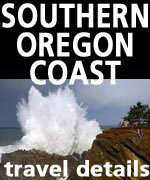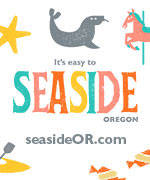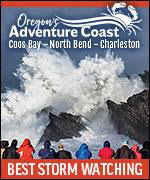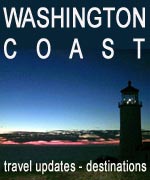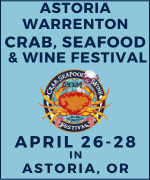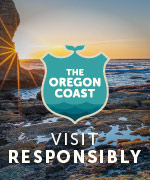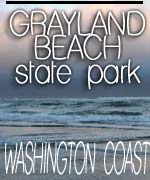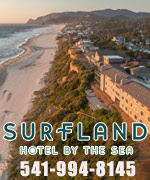Ewww, 'Globsters' of Oregon / Washington Coast and Their Paranormal Past
Published 05/10/2020 at 4:44 AM PDT
By Oregon Coast Beach Connection staff
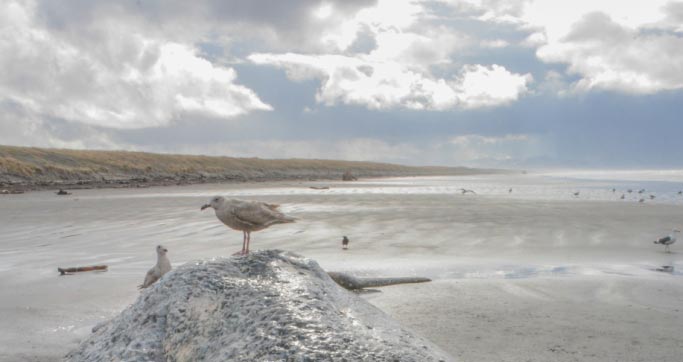
Includes exclusive listings; some specials in winter
In Cannon Beach:
Includes rentals not listed anywhere else
In Manzanita, Wheeler, Rockaway Beach:
Some specials for winter
In Pacific City, Oceanside:
Some specials for winter
In Lincoln City:
Some specials for winter
In Depoe Bay, Gleneden Beach:
Some specials for winter
In Newport:
Look for some specials
In Waldport
Some specials for winter
In Yachats, Florence
Some specials for winter
(Seaside, Oregon) – Warning, don’t be eating anything as you read this article. (Photo above: a near-globster in 2017, courtesy Seaside Aquarium)
Perhaps the grossest thing you can find on the Oregon coast or Washington coast (or any beach in the world) is what is sometimes referred to as the “globster.” It’s a particularly disgusting form of stranded whale corpse that has actually spawned paranormal legends in the past, and its smell will make you want to run away as from an actual monster.
Globsters may be nasty in a uniquely terrible way but they have a fascinating if not somewhat comical role in history.
A globster is really a strange slang (and psuedo-science) term only occasionally used these days, referring to the corpse of a whale that is often barely recognizable because of its advanced decayed state. Everything dies, and in the ocean that means sometimes these dead things wash ashore (really it’s rather amazing you don’t see more dead stuff on the Oregon or Washington coasts considering the sheer immensity of lifeforms out there.) Occasionally, particularly with whales or larger things like seals and sea lions, they wind up floating around out there and rotting the whole time, and then abruptly they come onshore instead of sinking to the bottom.
In rarer cases, they’ve been decomposing for weeks and suddenly make landfall. These, under some circumstances, can be so decayed you can’t tell what it is. It’s a mysterious “glob” of foul-smelling something. In some of these rare cases, not even the entire animal makes it onshore: just a chunk. This deepens the mystery as the corpse is so indefinable in the first place, yet it’s half or a third of the size of what it used to be.
For centuries, people have often misunderstood what these mysterious things were and sometimes believed they had come across new, perhaps even mythical creatures, such as sea serpents, a giant octopus or giant squid, a la Jules Verne. Even the possibility these were aquatic dinosaurs was presented on occasion (those often turned out to be long-dead sharks). Even aliens have been postulated. All that often happened through much of the 20th century, something that acquired new vigor when the whole “paranormal investigation” idea was invented and popularized, even in that day and age ignoring what science and common sense told them.
Yet that wasn’t always the public’s fault. Later on, DNA testing started proving what these were, and other more responsible science folk have always been able to discern the true species of these globsters (or sometimes called “blobs”).

Above: a true-blue globster in 2007, taken by Seaside Aquarium's Tiffany Boothe
Among the more reasonable globster-finders are the crew at Seaside Aquarium, who have discovered a few stranded creatures and blobs along the north Oregon coast over the last decade and a half that were downright puzzling. One case in 2007 saw aquarium staff reporting a true-blue globster to Oregon Coast Beach Connection, finding a nasty mass of gooey corpse that didn’t look like anything. It was only part of a sperm whale, they quickly found. How they withstood the rank odor to check its anatomy is still a mystery, and frankly better left not dwelled upon.
Part of the thing that throws people is that these yucky specimens look “hairy.” That’s not hair – that’s simply heavily rotted flesh.
A zombie apocalypse doesn’t sound so fun anymore, does it?
In 1962, it was a somewhat kooky biologist named Ivan T. Sanderson who coined the term “globster.” He was referring to a carcass in Tasmania two years before that had "no visible eyes, no defined head, and no apparent bone structure." According to author Sue L. Hamilton in her 2010 book “Monsters,” scientists soon figured out it was merely a disgustingly gooey remnant of a whale.
Sanderson was originally a biologist and then soon moved into the suspect territory of cryptozoology, even becoming a science fiction writer for a time.
“Globster” is now used with a bit of humor, especially in the internet age. But its origins are actually even more amusing.
What happens to globsters when they wash up on the Washington coast or Oregon coast?
If they’re in a fairly populated area, they get buried. Hopefully, that is, and policy differs on locale. The problem with globsters isn’t just the fact they smell 20 times worse than any regular stranded whale corpse, but like any such beached deceased marine creature laying around they carry the possibility of disease. Touch one and you could get something nasty. Dogs are especially at risk.
One incident in Seaside in 2014 had residents complaining about the smell – two blocks away. That and the density of beachgoers was cause for burial. However, another incident the Seaside Aquarium responded to happened at Warrenton where the beach narrowed too much to be buried. State officials simply let that one get eaten by birds.
Back then, the aquarium’s Tiffany Boothe told Oregon Coast Beach Connection: “By not burying the carcass shorebirds and raptors will be able to feast on this fatty-rich food. Leaving the carcass on the beach is really good for the beach ecosystem.”
More "globster" photos below (warning: not for the squeamish).
Oregon Coast Hotels in this area - Where to eat - Maps - Virtual Tours
Cannon Beach Lodging
Nehalem Bay Lodgings
Manzanita Hotels, Lodging
Three Capes Lodging
Pacific City Hotels, Lodging
Lincoln City Lodging
Depoe Bay Lodging
Newport Lodging
Waldport Lodging
Yachats Lodging
Oregon Coast Vacation Rentals
Oregon Coast Lodging Specials
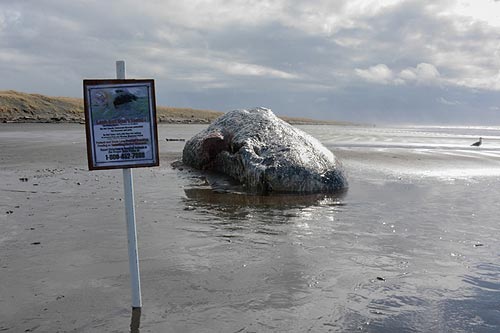
Photo: Tiffany Boothe of Seaside Aquarium
More About Oregon Coast hotels, lodging.....
More About Oregon Coast Restaurants, Dining.....
LATEST Related Oregon Coast Articles
The building had also been robbed of pipes and copper by other thieves. True Crime, Astoria, Warrenton
Oregon Coast Crabbing Petition Denied, Rulemaking Process Remains on Course
A petition on procedural matters denied; no major changes yet. Whale
S. Oregon Coast Wind Warnings, Waves Up To 23 Feet
Gusts up to 65 and high waves for the weekend from Reedsport to Brookings. Weather
Newport Latest Oregon Coast Town to Ban Personal Fireworks Year-Round
City countcil voted this week; the pro fireworks display goes on as usual
Hazardous Seas Watch on N. Oregon Coast, S. Washington Coast, Waves Up To 15 Ft
Beaches will require caution but some good wave shows possible
Annual 'Maine' Event Returns to N. Oregon Coast's Seaside Aquarium
February 22 brings the fundraiser to Seaside. Seaside events
From Taking In Cool Oregon Coast Colors on the Patio to Seaside's Action
Review of Seaside's Seashore Inn on the Beach: spectacle with breakfast and your dog. Seaside hotel reviews
Oregon US Coast Guard Team Assists in Olympic National Forest Rescue
Helicopter team from Astoria rescued hikers on Washington's Mount Ellinor
Back to Oregon Coast
Contact Advertise on BeachConnection.net
All Content, unless otherwise attributed, copyright BeachConnection.net Unauthorized use or publication is not permitted












